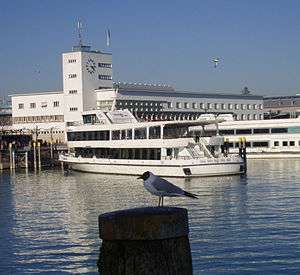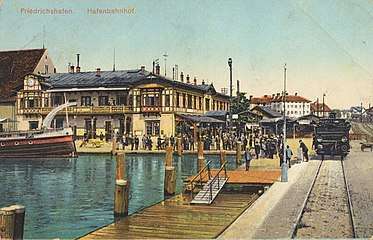Friedrichshafen Stadt–Friedrichshafen Hafen railway
Thee Friedrichshafen Stadt–Friedrichshafen Hafen railway (or Friedrichshafen City–Friedrichshafen Port railway; German: Bahnstrecke Friedrichshafen Stadt–Friedrichshafen Hafen) is a standard gauge and non-electrified railway line in the city of Friedrichshafen in the German state of Baden-Württemberg. It connects the town station with the port station. The 816 metre-long branch line has its own VzG route number, 4531, although operationally it is a connection between two parts of the same station.
| Friedrichshafen Stadt–Friedrichshafen Hafen railway | |||||||||||||||||||||||||||||||||||||||||||||||||||||||||||||||||||||
|---|---|---|---|---|---|---|---|---|---|---|---|---|---|---|---|---|---|---|---|---|---|---|---|---|---|---|---|---|---|---|---|---|---|---|---|---|---|---|---|---|---|---|---|---|---|---|---|---|---|---|---|---|---|---|---|---|---|---|---|---|---|---|---|---|---|---|---|---|---|
 Friedrichshafen Hafen terminus | |||||||||||||||||||||||||||||||||||||||||||||||||||||||||||||||||||||
| Overview | |||||||||||||||||||||||||||||||||||||||||||||||||||||||||||||||||||||
| Locale | Baden-Württemberg, Germany | ||||||||||||||||||||||||||||||||||||||||||||||||||||||||||||||||||||
| Line number | 751 | ||||||||||||||||||||||||||||||||||||||||||||||||||||||||||||||||||||
| Technical | |||||||||||||||||||||||||||||||||||||||||||||||||||||||||||||||||||||
| Line length | 0.816 km (0.507 mi) | ||||||||||||||||||||||||||||||||||||||||||||||||||||||||||||||||||||
| Number of tracks | 2 | ||||||||||||||||||||||||||||||||||||||||||||||||||||||||||||||||||||
| Track gauge | 1,435 mm (4 ft 8 1⁄2 in) standard gauge | ||||||||||||||||||||||||||||||||||||||||||||||||||||||||||||||||||||
| Route number | 4531 | ||||||||||||||||||||||||||||||||||||||||||||||||||||||||||||||||||||
| |||||||||||||||||||||||||||||||||||||||||||||||||||||||||||||||||||||
History
After Friedrichshafen had been connected to the first section of the Ulm–Friedrichshafen railway in 1847, the Royal Württemberg State Railways (Königlich Württembergische Staats-Eisenbahnen) began on the construction of the extension towards the port in 1849. The new line to the shore of Lake Constance finally opened on 1 June 1850. Its maximum gradient is 1:45 and its minimum curve radius is 150 metre.[2] Its main purpose continues to be to link the German railway network and the international Friedrichshafen–Romanshorn ferry line. Until 1974 there was a train ferry to Switzerland.
Operations
The line belongs to Deutsche Bahn. In addition to carrying DB regional trains, it has been used since 1 June 1997 by the railcars of the private Bodensee-Oberschwaben-Bahn (BOB) between city and port stations, which have to reverse in the city station. In terms of fares, the connection – like all lines in the region – has been integrated into the Bodensee-Oberschwaben Verkehrsverbund (Bodensee-Oberschwaben transport association, bodo), which was founded on 1 January 2004, from the start.
References
Footnotes

- Eisenbahnatlas Deutschland (German railway atlas) (10 ed.). Schweers + Wall. 2017. p. 112. ISBN 978-3-89494-146-8.
- Scharf & Wollny 1993, pp. 86f..
Sources
- Scharf, Hans Wolfgang; Wollny, Burkhard (1993). Die Eisenbahn am Bodensee [The railway to Lake Constance] (in German). EK Freiburg. ISBN 3-88255-758-3.CS1 maint: ref=harv (link)
- Schmidt, Uwe (2004). Die Südbahn. Eisenbahn und Industrialisierung in Ulm und Oberschwaben [The Southern Railway. Railways and industrialisation in Ulm and Upper Swabia] (in German). Ulm: Süddeutsche Verlags-Gesellschaft. ISBN 3-88294-342-4.
- Supper, Otto (1981). Die Entwicklung des Eisenbahnwesens im Königreich Württemberg [The development of railways in the Kingdom of Württemberg] (in German). Stuttgart: Kohlhammer. ISBN 3-17-005976-9. (reprint of 1895 edition)